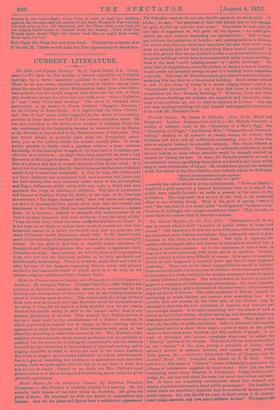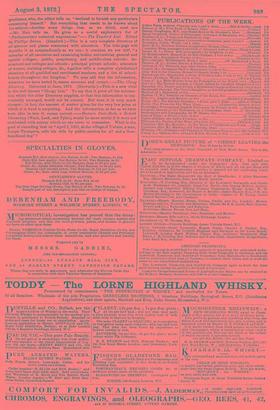The Annual Register, for the Year 1871. (Rivingtons.)—It is not
easy to review what is itself "a review of public events at home and abroad." Our impression is that the Annual Register, with which indeed are connected more literary associations than commonly attach to pub- lications of this kind, is very well done. The style is vigorous, the matter well arranged, and a vast amount of information crowded into a volume of moderate compass. As to the usefulness of such a book, so long as it be done reasonably well, there can be no question. Contem- porary history is often very difficult of access. It is easier to ascertain details of what happened a hundred years ago than of what happened yesterday. Those are to be found compendiously stated in history; these are buried under the mountains of rubbish—or what becomes rubbish in the course of a week—which in the modern newspaper cover the grains of really historical incidents. The volume before us devotes a hundred pages to a summary of Parliamentary proceedings ; two more chapters, not quite fifty pages, give a chronicle of domestic events. About seventy pages are given to France. The other countries of Europe, happier in not having so much history, are content with something less. It is possible that our cousins on the other side of the Atlantic may be offended to find that the two continents of America and Asia are put into a single chapter. It is really surprising that the affairs of such a nation as the United States—English-speaking and therefore supplying abundant materials—should occupy so small a space. These books are, after all, the reflex of public sentiment. India is dismissed with equally significant brevity in about three pages,—quito as much as the public wants to hear about some hundred .and fifty millions of people. A re- view of literature and science completes what may be called the "History " portion of the volume. That which follows may be described as the " Annals " of the year, giving a chronicle of events, short obituary notices of eminent persons, and reports of great trials, State papers, &c.—Debreit's Illustrated House of Commons and the Judicial Bench, 1872. Compiled and ddited by R. II. Hair. (Dean and Son.)—The name of "Debrett " seems sufficiently to guarantee the fullness of information supplied by these books. Here you can learn everything about every 'Member of Parliament, Judge, County-court Judge, etc., and not only about the men, but about their wives and fami- lies. Is there not something unreasonable about this demand and supply of private information about public personages? The families in which there are hereditary dignities may be considered matters of real public interest. But why should we want to know whom A. B., county- court judge, married, and how many children he has? We respect the gentleman who, the editor tells us, "declined to furnish any particulars concerning himself." Bat everything that needs to be known about his subject—besides some things that, as we think, need not —Mr. Mair tells ns. He gives us a useful explanatory list of " Parliamentary technical expressions."— The Teachers' List. Edited by Phillips Bevan. (Stanford.)—This is a very complete directory of all persons and places connected with education. The title-page will describe it as compendiously as we can ; it contains, we are told, "a calendar of all executive and examining bodies, universities, general and special colleges ; public, proprietary, and middle-class schools ; de- nominational colleges and schools ; principal private schools ; education of women, training colleges, &c., together with a complete alphabetical directory of all qualified and certificated teachers, and a list of school- boards throughout the kingdom." We may add that the information, wherever we have tested it, seems accurate and recent.—The Clergy Directory. Corrected to June, 1872. (Bosworth.)—This is a new rival to the well known " Clergy List." To say that it gives all the informa- tion which the older Directory supplies, or that this information is con- veniently arranged, would not be correct. But then it is very much cheaper ; in fact, the amount of matter given for the very low price at which it is fixed is surprising. And the information, as far as we have been able to test it. seems correct.—Beeton's Date-Book, a British Chronology (Ward, Lock, and Tyler), would be more useful if it wore not overloaded with matter which no one cares to remember. What is the good of recording that on "April 7, 1821, at tho village of Uxham, a man, Joseph Thompson, sells his wife by public auction for Z7 and a New- foundland dog"?



































 Previous page
Previous page